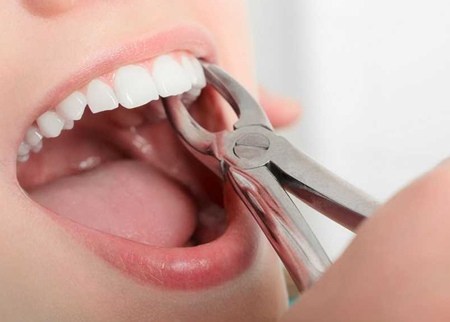extraction

How to prepare for a tooth extraction
Before scheduling the procedure, your dentist will take an X-ray of your tooth. Be sure to tell your dentist about any medications you take, as well as vitamins, supplements, and over-the-counter drugs.
Tell your dentist if you will soon be treated for another medical condition with an intravenous drug called a bisphosphonate. If so, the extraction should be done before the drug treatment, or your jaw could be at risk for osteonecrosis (bone death).
Also, tell your dentist about any of the following conditions:
- A congenital heart defect
- Diabetes
- Liver disease
- Thyroid disease
- Renal disease
- Hypertension
- An artificial joint
- Damaged heart valves
- Adrenal disease
- An impaired immune system
- A history of bacterial endocarditis
Your dentist may want to make sure all conditions are stable or treated before you undergo the tooth extraction. You might be prescribed antibiotics in the days leading up to the procedure if:
- Your surgery is expected to be long
- You have an infection or a weakened immune system
- You have a specific medical condition
It’s helpful to keep the following in mind for the day of the tooth extraction in order to ensure quality treatment:
- If you will be receiving intravenous (IV) anesthesia, wear a short-sleeved shirt or loose-fitted clothing, and don’t eat or drink for six to eight hours before your appointment.
- Don’t smoke beforehand.
- Tell your dentist if you have a cold, as you may need to reschedule.
- Tell your dentist if you had nausea or vomiting the night before, which may require different anesthesia or rescheduling.
- If you’re receiving general anesthesia, have someone with you to drive you home.
What is the procedure for a tooth extraction?
Simple extractionYou will receive a local anesthetic, which numbs the area around your tooth so you’ll feel only pressure, not pain, during the procedure. The dentist then uses an instrument called an elevator to loosen the tooth and forceps to remove it.
Surgical extractionYou will likely receive both local anesthesia and intravenous anesthesia, the latter of which makes you calm and relaxed. You may also receive general anesthesia, depending on any medical conditions. With general anesthesia, you will remain unconscious during the procedure.
What is the recovery period from a tooth extraction?
It normally takes a few days to recover after a tooth extraction. The following steps help ensure that your recovery goes smoothly.
- Apply an ice pack to your cheek directly after the procedure to reduce swelling. Use the ice pack for 10 minutes each time.
- After the dentist places the gauze pad over the affected area, bite down to reduce bleeding and to aid in clot formation. Leave the gauze on for three to four hours, or until the pad is soaked with blood.
- Take any medications as prescribed, including over-the-counter painkillers.
- Rest and relax for the first 24 hours. Do not jump immediately into your regular routine the following day.
- Don’t use a straw for the first 24 hours.
- Don’t smoke.
- Don’t rinse for 24 hours after the tooth extraction, and spit only gently.
- Use pillows to prop your head up when you lie down.
- Brush and floss your teeth like normal, but avoid the extraction site.
- The day after the procedure, eat soft foods, such as yogurt, pudding, and applesauce.
- After 24 hours, add a half-teaspoon of salt to eight ounces of warm water to rinse out your mouth.
- As you heal over the next few days, you can slowly reintroduce other foods into your diet.



